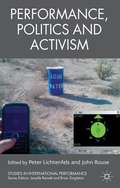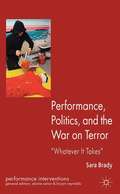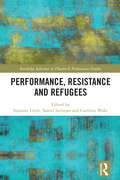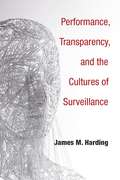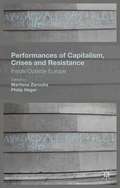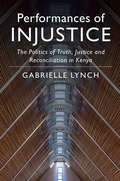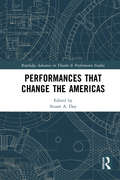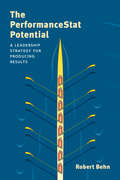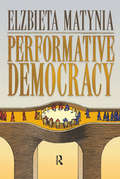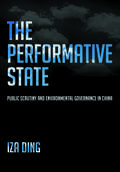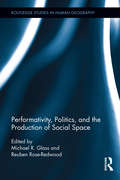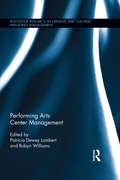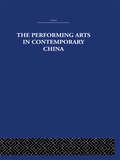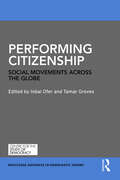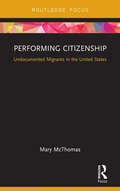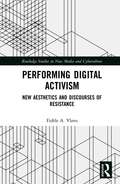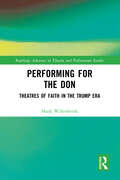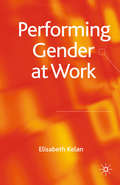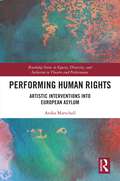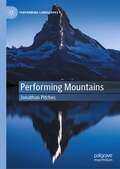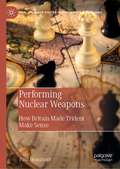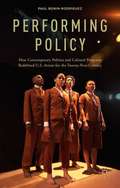- Table View
- List View
Performance, Politics and Activism
by Peter Lichtenfels John RouseThis collection of essays on politics, the performing arts, and various forms of activist performance uses the framework of performance studies to explore the engagements of political resistance, public practice and performance media. It places these engagements on various scales of performance production within local, national and transnational structures of neoliberal and liberal government and power. Performance has always been a way of articulating the conditions of contemporary society, and of pointing through the body of the performance to ways of defining, understanding and changing those conditions. Throughout these essays performance takes place in the environments of heightened everyday action, the aesthetic and cultural activity of the performing arts, and in the activist performance of political commitment. These trajectories in performance studies delineate the way people identify themselves and communicate with one another, both in attempts to change the structures of governance they experience, and vitally, alongside those structures.
Performance, Politics, and the War on Terror
by Sara BradyUsing a performance studies lens, this book is a study of performance in the post-9/11 context of the so-called war on terror. It analyzes conventional theatre, political protest, performance art and other sites of performance to unpack the ways in which meaning has been made in the contemporary global sociopolitical environment.
Performance, Resistance and Refugees (Routledge Advances in Theatre & Performance Studies)
by Suzanne Little Samid Suliman Caroline WakeThis book offers a unique Australian perspective on the global crisis in refugee protection. Using performance as both an object and a lens, this volume explores the politics and aesthetics of migration control, border security and refugee resistance. The first half of the book, titled On Stage, examines performance objects such as verbatim and documentary plays, children’s theatre, immersive performance, slam poetry, video art and feature films. Specifically, it considers how refugees, and their artistic collaborators, assert their individuality, agency and authority as well as their resistance to cruel policies like offshore processing through performance. The second half of the book, titled Off Stage, employs performance as a lens to analyse the wider field of refugee politics, including the relationship between forced migrants and the forced displacement of First Nations peoples that underpins the settler-colonial state, philosophies of cosmopolitanism, the role of the canon in art history and the spectacle of bordering practices. In doing so, it illuminates the strategic performativity—and nonperformativity—of the law, philosophy, the state and the academy more broadly in the exclusion and control of refugees. Taken together, the chapters in this volume draw on, and contribute to, a wide range of disciplines including theatre and performance studies, cultural studies, border studies and forced migration studies, and will be of great interest to students and scholars in all four fields.
Performance, Transparency, and the Cultures of Surveillance
by James M. HardingPlacing the disciplines of performance studies and surveillance studies in a timely critical dialogue, Performance, Transparency, and the Cultures of Surveillance not only theorizes how surveillance performs but also how the technologies and corresponding cultures of surveillance alter the performance of everyday life. This exploration draws upon a rich array of examples from theatre, performance, and the arts, all of which provide vivid illustration of the book’s central argument: that the rise of the surveillance society coincides with a profound collapse of democratic oversight and transparency—a collapse that, in turn, demands a radical rethinking of how performance practitioners conceptualize art and its political efficacy. The book thus makes the case that artists and critics must reexamine—indeed, must radically redefine—their notions of performance if they are to mount any meaningful counter to the increasingly invasive surveillance society.
Performances of Capitalism, Crises and Resistance
by Marilena Zaroulia Philip HagerThis engaging study examines the issue of crisis in European performance since the collapse of global financial markets in 2008. The book's chapters examine diverse performances of crisis primarily in three cities with a loaded past and present for Europe, as idea and geopolitical reality: London, Athens and Berlin. Presenting a range of work – from the National Theatre's repertoire to alternative forms of theatre-making in 'other' spaces; from the Occupy LSX to cultural performance and 'invisible', quotidian performances – Performances of Capitalism, Crises and Resistance presents new approaches to performance as a form 'in crisis' and as reflecting the in-crisis permutation of the 'inside/outside' dichotomy, fundamental in the conception of Europe and the EU. In doing so, this book makes an argument for performance within and against neoliberal promises; as a monolithic factor implicated in the machinery of capitalism or multiple, emergent bodies of resistance.
Performances of Injustice: The Politics of Truth, Justice and Reconciliation in Kenya
by Gabrielle LynchFollowing unprecedented violence in 2007/8, Kenya introduced two classic transitional justice mechanisms: a truth commission and international criminal proceedings. Both are widely believed to have failed, but why? And what do their performances say about contemporary Kenya; the ways in which violent pasts persist; and the shortcomings of transitional justice? Using the lens of performance, this book analyses how transitional justice efforts are incapable of dealing with how unjust and violent pasts actually persist. Gabrielle Lynch reveals the story of an ongoing political struggle requiring substantive socio-economic and political change that transitional justice mechanisms can theoretically recommend, and which they can sometimes help to initiate and inform, but which they cannot implement or create, and can sometimes unintentionally help to reinforce.
Performances that Change the Americas (Routledge Advances in Theatre & Performance Studies)
by Stuart A. DayThis collection of essays explores activist performances, all connected to theater or performance training, that have changed the Americas—from Canada to the Southern Cone. Through the study of specific examples from numerous countries, the authors of this volume demonstrate a crucial, shared outlook: they affirm that ordinary people change the direction of history through performance. This project offers concrete, compelling cases that emulate the modus operandi of people like historian Howard Zinn. In the same spirit, the chapters treat marginal groups whose stories underscore the potentially unstoppable and transformative power of united, embodied voices. This book will be of great interest to students and scholars of theatre, performance, art and politics.
The PerformanceStat Potential
by Robert D. BehnIt started two decades ago with CompStat in the New York City Police Department, and quickly jumped to police agencies across the U.S. and other nations. It was adapted by Baltimore, which created CitiStat-the first application of this leadership strategy to an entire jurisdiction. Today, governments at all levels employ PerformanceStat: a focused effort by public executives to exploit the power of purpose and motivation, responsibility and discretion, data and meetings, analysis and learning, feedback and follow-up-all to improve government's performance.Here, Harvard leadership and management guru Robert Behn analyzes the leadership behaviors at the core of PerformanceStat to identify how they work to produce results. He examines how the leaders of a variety of public organizations employ the strategy-the way the Los Angeles County Department of Public Social Services uses its DPSSTATS to promote economic independence, how the City of New Orleans uses its BlightStat to eradicate blight in city neighborhoods, and what the Federal Emergency Management Agency does with its FEMAStat to ensure that the lessons from each crisis response, recovery, and mitigation are applied in the future. How best to harness the strategy's full capacity? The PerformanceStat Potential explains all.
Performative Democracy
by Elzbieta Matyniafresh appreciation of the events of 1989 as we approach their 20th anniversary in 2009 Performative Democracy explores a potential in political life that easily escapes theorists: the indigenously inspired enacting of democracy by citizens. Written by one who experienced an emerging public sphere within Communist Poland, the book seeks to identify the conditions for performativity-performing politics--in public life. It examines a broad spectrum of cultural, social, and political initiatives that facilitated the non-violent transformation of an autocratic environment into a democratic one. Examples of performativity range from experimental student theater, through the engaged political thinking of dissident Adam Michnik, the alternative culture, and the Solidarity movement, to the drama of the Round Table Talks (and their striking parallels in South Africa), and finally, the post-1989 efforts of feminist groups and women artists to defend the recently won right of free public discourse. The book argues that performative democracy, with its improvisational mode and imaginative solutions, deserves a legitimate place in our broader reflections on democracy. Matynia describes how two apparent miracles of recent history-that communism in Poland was brought down without violence and that apartheid in South Africa was ended without a bloodbath-were the results of hard work and a new approach to change that she calls "performative democracy." Matynia reveals amazing parallels between the drama of Poland's Round Table Talks in 1989 and the Truth Commissions in South Africa in 1994. Matynia describes how experimental student theater groups, though subsidized by a totalitarian regime afraid of any authentic public life, created little pockets of public space for free and meaningful expression that were augmented by uncensored underground publishing and further expanded by the Solidarity movement into a democratic society within the totalitarian state. Matynia describes in a personal way how in the 1970s student theater groups planted the seeds of an authentic public sphere, how underground publishers nurtured freedom of expression and social criticism, and how, after democratic elections, women artists in the 1990s fought to sustain the newly won right to free public discourse. Matynia traces in vivid human terms the democratic aspirations and practices that led to democratic change in Poland but went largely unnoticed by western media and policymakers.
The Performative Presidency
by Jason L. MastThe Performative Presidency brings together literatures describing presidential leadership strategies, public understandings of citizenship, and news production and media technologies between the presidencies of Theodore Roosevelt and Bill Clinton, and details how the relations between these spheres have changed over time. Jason L. Mast demonstrates how interactions between leaders, publics, and media are organized in a theatrical way, and argues that mass mediated plot formation and character development play an increasing role in structuring the political arena. He shows politics as a process of ongoing performances staged by motivated political actors, mediated by critics, and interpreted by audiences, in the context of a deeply rooted, widely shared system of collective representations. The interdisciplinary framework of this book brings together a semiotic theory of culture with concepts from the burgeoning field of performance studies.
The Performative State: Public Scrutiny and Environmental Governance in China
by Iza DingWhat does the state do when public expectations exceed its governing capacity? The Performative State shows how the state can shape public perceptions and defuse crises through the theatrical deployment of language, symbols, and gestures of good governance—performative governance.Iza Ding unpacks the black box of street-level bureaucracy in China through ethnographic participation, in-depth interviews, and public opinion surveys. She demonstrates in vivid detail how China's environmental bureaucrats deal with intense public scrutiny over pollution when they lack the authority to actually improve the physical environment. They assuage public outrage by appearing responsive, benevolent, and humble. But performative governance is hard work. Environmental bureaucrats paradoxically work themselves to exhaustion even when they cannot effectively implement environmental policies. Instead of achieving "performance legitimacy" by delivering material improvements, the state can shape public opinion through the theatrical performance of goodwill and sincere effort. The Performative State also explains when performative governance fails at impressing its audience and when governance becomes less performative and more substantive. Ding focuses on Chinese evidence but her theory travels: comparisons with Vietnam and the United States show that all states, democratic and authoritarian alike, engage in performative governance.
Performativity, Politics, and the Production of Social Space: Performativity, Politics, And The Production Of Social Space (Routledge Studies in Human Geography #51)
by Michael R. Glass Reuben Rose-RedwoodTheories of performativity have garnered considerable attention within the social sciences and humanities over the past two decades. At the same time, there has also been a growing recognition that the social production of space is fundamental to assertions of political authority and the practices of everyday life. However, comparatively little scholarship has explored the full implications that arise from the confluence of these two streams of social and political thought. This is the first book-length, edited collection devoted explicitly to showcasing geographical scholarship on the spatial politics of performativity. It offers a timely intervention within the field of critical human geography by exploring the performativity of political spaces and the spatiality of performative politics. Through a series of geographical case studies, the contributors to this volume consider the ways in which a performative conception of the "political" might reshape our understanding of sovereignty, political subjectification, and the production of social space. Marking the 20th anniversary of the publication of Judith Butler’s classic, Bodies That Matter (1993), this edited volume brings together a range of contemporary geographical works that draw exciting new connections between performativity, space, and politics.
Performing Anti-Slavery
by Gay Gibson CimaIn Performing Anti-Slavery, Gay Gibson Cima reimagines the connection between the self and the other within activist performance, providing fascinating new insights into women's nineteenth-century reform efforts, revising the history of abolition, and illuminating an affective repertoire that haunts both present-day theatrical stages and anti-trafficking organizations. Cima argues that black and white American women in the nineteenth-century abolitionist movement transformed mainstream performance practices into successful activism. In family circles, literary associations, religious gatherings, and transatlantic anti-slavery societies, women debated activist performance strategies across racial and religious differences: they staged abolitionist dialogues, recited anti-slavery poems, gave speeches, shared narratives, and published essays. Drawing on liberal religious traditions as well as the Eastern notion of transmigration, Elizabeth Chandler, Sarah Forten, Maria W. Stewart, Sarah Douglass, Lucretia Mott, Ellen Craft and others forged activist pathways that reverberate to this day.
Performing Arts Center Management (Routledge Research in the Creative and Cultural Industries)
by Patricia Dewey Lambert Robyn WilliamsPerforming arts centers (PACs) are an integral part of the cultural and creative industries, significantly influencing the cultural, social, and economic vitality of communities around the world. Virtually all PACs are community-based and serve the public interest, whether structured as a public, nonprofit, for-profit, or hybrid entity. However, there is a lack of knowledge about the important community role of performing arts centers, especially those that mainly host and present work produced by other arts organizations. This gap is startling, given the ubiquitous presence of PACs in urban centers, small communities, as well as colleges and universities. This co-edited reference book provides valuable information at the intersection of theory and practice in the professional field of executive leadership of performing arts centers. Drawing on the expertise of leading academics, consultants, and executives, this book focuses on institutions and practices in the United States, and is contextualized within additional fields such as cultural planning, urban revitalization, and economic development. Performing Arts Center Management aims to provide valuable theoretical, conceptual, empirical, and practice-based information to current and future leaders in creative and cultural industries management. It serves as a unique reference for researchers, university students, civic leaders, urban planners, public venue managers, and arts administrators aspiring to improve or advance their work in successfully managing performing arts centers.
The Performing Arts in Contemporary China
by Colin MackerrasFirst published in 1981.The overthrow of the 'gang of four' in October 1976 had profound effects in all areas of Chinese society, and probably nowhere can this be more clearly seen than in the performing arts. Jiang Qing, Mao Zedong's widow, was strongly interested in the performing arts and exercised great influence over them. This book describes her influence and the effects its removal had on the arts. Although the period covered is mainly that since the death of Mao, there is also considerable reference to the years following the Cultural Revolution.
Performing Citizenship: Social Movements across the Globe (Routledge Advances in Democratic Theory)
by Tamar Groves Inbal OferIn this book, Tamar Groves and Inbal Ofer explore the effects of social movements' activism on the changing practices and conceptions of citizenship. Presenting empirically rich case studies from Latin America, Asia and Europe, leading experts analyze the ways in which the shifting balance of power between nation-state, economy and civil society over the past half century affected social movements in their choice of addressees and repertoires of action. Divided into two parts, the first part focuses on citizenship as a form of political and cultural participation. The three case studies that make up this section look into the ways in which social movements' activism prompted a critical re-evaluation of two central questions: Who can be considered a citizen? And what forms of political and cultural participation effectively enable citizens to exercise their rights? The second section focuses on citizenship as a form of community building. The three case studies that are included in this section address the ways in which activism fosters new forms of advocacy and communication, leading to the emergence of new communities and assigning qualities of fraternity to the status of citizenship. Throughout most of the 20th century social movements' literature focused on the challenges these entities posed to the state, since it was the state that had the capacity and willingness to grant social and economic concessions. This situation started to shift in the late 1960s. By the 1980s the existing configuration between the state, civil society and the economy was increasingly challenged by market penetration. Accordingly, we witness a proliferation of social movements that no longer target state institutions, or do so only partially. Their repertoires of action interact continuously with everyday practices, re-shaping demands within specific organizational, legislative and political contexts. As a result, such activism expands the understanding of the concept of citizenship so as to include demands relating to livelihood; division of resources; the production and dissemination of knowledge; and forms of civic participation and solidarity. Written for scholars who study social movements, citizenship and the relationship between the state and civil society over the past half century, this book provides a fresh insight on the nature of citizenship; increasingly framing the condition of being a citizen in terms of performance and on-going practices, rather than simply in relation to the attainment of a formal status.
Performing Citizenship: Undocumented Migrants in the United States
by Mary McThomasUndocumented migrants in the United States raise compelling questions about political legitimacy, obligation, and citizenship. If they are truly members of their communities, should they have a voice in the laws and policies that impact their lives? Should their interests be considered, especially in light of exploitation by employers, the possibility of detention and the threat of deportation? This book argues that we do indeed owe certain moral and political obligations to those individuals who have been living and contributing to their communities, regardless of whether they initially arrived without documents. McThomas' argument is based on flipping the way we think about political obligation and state-granted citizenship. Instead of the conventional understanding that the conferral of rights by the state obligates citizens to perform certain duties, she argues that the performance of civic duties and obligations – "performing citizenship" – should trigger corresponding rights and protections. The book combines theory and practice to make this argument, analyzing state-level legislative debates about extending driving privileges and in-state tuition rates to undocumented residents. Consistent with the book’s main argument, we see contested notions of what constitutes citizenship in these debates and a growing acknowledgment that those who perform citizenship deserve certain rights and privileges.
Performing Citizenship in Plato's Laws
by Lucia PrauscelloIn the Laws, Plato theorizes citizenship as simultaneously a political, ethical, and aesthetic practice. His reflection on citizenship finds its roots in a descriptive psychology of human experience, with sentience and, above all, volition seen as the primary targets of a lifelong training in the values of citizenship. In the city of Magnesia described in the Laws erôs for civic virtue is presented as a motivational resource not only within the reach of the 'ordinary' citizen, but also factored by default into its educational system. Supporting a vision of 'perfect citizenship' based on an internalized obedience to the laws, and persuading the entire polity to consent willingly to it, requires an ideology that must be rhetorically all-inclusive. In this city 'ordinary' citizenship itself will be troped as a performative action: Magnesia's choral performances become a fundamental channel for shaping, feeling and communicating a strong sense of civic identity and unity.
Performing Digital Activism: New Aesthetics and Discourses of Resistance (Routledge Studies in New Media and Cyberculture)
by Fidèle A. VlavoFrom the emergence of digital protest as part of the Zapatista rebellion, to the use of disturbance tactics against governments and commercial institutions, there is no doubt that digital technology and networks have become the standard features of 21st century social mobilisation. Yet, little is known about the historical and socio-cultural developments that have transformed the virtual sphere into a key site of political confrontation. This book provides a critical analysis of the developments of digital direct action since the 1990s. It examines the praxis of electronic protest by focussing on the discourses and narratives provided by the activists and artists involved. The study covers the work of activist groups, including Critical Art Ensemble, Electronic Disturbance Theater and the electrohippies, as well as Anonymous, and proposes a new analytical framework centred on the performative and aesthetic features of contemporary digital activism.
Performing for the Don: Theaters of Faith in the Trump Era (Routledge Advances in Theatre & Performance Studies)
by Hank WillenbrinkThis volume examines the intersection of political power and religion during the presidency of Donald Trump through an examination of performance. This study begins with an examination of white evangelical Christian support for Trump through readings of the 2018 film The Trump Prophecy, based on a book of the same name, and The Faith of Donald J. Trump, a "spiritual biography" of the former president by veteran Christian reporters David Brody and Scott Lamb. White evangelicals Christianized Trump during his run for office in 2016 and Trump’s ascension to the presidency broke down barriers between church and state in service of dominionistic Christian aims. This exploration then looks at the conservative Catholicism through an exploration of Heroes of the Fourth Turning, a finalist for the 2019 Pulitzer Prize for Drama by Will Arbery, and Rod Dreher’s The Benedict Option. While Trump’s connection to evangelicals is well documented, conservative Catholics like Attorney General Bill Barr and Supreme Court Justice Amy Coney Barrett took on pivotal roles during the Trump administration demonstrating the significance of conservative Catholicism to his presidency. The author finally examines the "cult" of Trump on the internet by interrogating the performance of spirituality in pro-Trump conspiracy theories like QAnon. This book will be of great interest not only to theatre and performance studies scholars but also scholars with interests in political and religious studies.
Performing Gender at Work
by Elisabeth KelanProviding aaunique insight into how gender is performed in contemporary high-tech work andaintroducing a creative and novel way of analyzing the fluidity and rigidity of gender at work through discourse analytic methods the author highlights how changes in the world of work interact with changes in gender relations. a"
Performing Human Rights: Artistic Interventions into European Asylum (Routledge Series in Equity, Diversity, and Inclusion in Theatre and Performance)
by Anika MarschallThis book enhances critical perspectives on human rights through the lens of performance studies and argues that contemporary artistic interventions can contribute to our understanding of human rights as a critical and embodied doing. This study is situated in the contemporary discourse of asylum and political art practices. It argues for the need to reimagine human rights as performative and embodied forms of recognition and practical honouring of our shared vulnerability and co-dependency. It contributes to the debate of theatre and migration, by understanding that contemporary asylum issues are complex and context specific, and that they do not only pertain to the refugee, migrant, asylum seeker or stateless person but also to privileged constituencies, institutional structures, forms of organisation and assembly. The book presents a unique mixed-methods approach that focuses equally on performance analyses and on political philosophy, critical legal studies and art history – and thus speaks to a range of politically interested scholars in all four fields.
Performing Mountains (Performing Landscapes)
by Jonathan PitchesLaunching the landmark Performing Landscapes series, Performing Mountains brings together for the first time Mountain Studies and Performance Studies in order to examine an international selection of dramatic responses to mountain landscapes. Moving between different registers of writing, the book offers a critical assessment of how the cultural turn in landscape studies interacts with the practices of environmental theatre and performance. Conceived in three main parts, it begins by unpicking the layers of disciplinary complexity in both fields, before surveying the rich history and practice of rituals, playtexts and site specific works inspired by mountains. The last section moves to a unique analysis of mountains themselves using key concepts from performance: training, scenography, acting and spectatorship. Threaded throughout is a very personal tale of mountain research, offering a handrail or alternative guide through the book.
Performing Nuclear Weapons: How Britain Made Trident Make Sense (Palgrave Studies in International Relations)
by Paul BeaumontThis book investigates the UK’s nuclear weapon policy, focusing in particular on how consecutive governments have managed to maintain the Trident weapon system. The question of why states maintain nuclear weapons typically receives short shrift: its security, of course. The international is a perilous place, and nuclear weapons represent the ultimate self-help device. This book seeks to unsettle this complacency by re-conceptualizing nuclear weapon-armed states as nuclear regimes of truth and refocusing on the processes through which governments produce and maintain country-specific discourses that enable their continued possession of nuclear weapons. Illustrating the value of studying nuclear regimes of truth, the book conducts a discourse analysis of the UK’s nuclear weapons policy between 1980 and 2010. In so doing, it documents the sheer imagination and discursive labour required to sustain the positive value of nuclear weapons within British politics, as well as providing grounds for optimism regarding the value of the recent treaty banning nuclear weapons.
Performing Policy
by Paul Bonin-RodriguezPerforming Policy explains how a movement in cultural policy that began in the 1990s redefined US artists' roles in society and enhanced their prospects for the twenty-first century. In the first years of the century, a series of landmark reports appeared, significantly expanding the nation's understanding of the relevance of arts to everyday life. Broadly, these reports covered issues of changing tastes and consumption habits, the relevance of culture to economic and social stability in communities, and the challenges facing artists and arts organizations in the new economy. Their publication coincided with a number of national initiatives that proposed and modelled new methods of artistic practice and sustainability. Analyzing the political origins and practical applications of recent advancements in arts policy, this book demonstrates how the redefining of artists took place and to what ends. At the same time, Performing Policy proposes a new definition through which artists might be productively acknowledged as co-creators of the nation's arts infrastructure.
